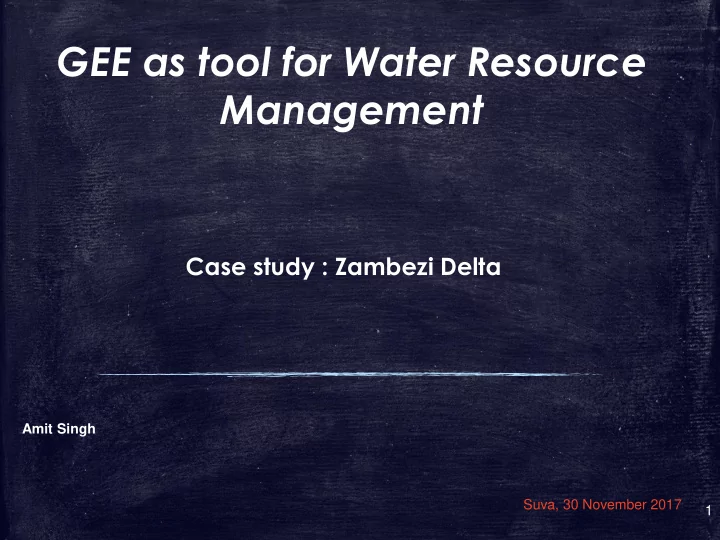

GEE as tool for Water Resource Management Case study : Zambezi Delta Amit Singh Suva, 30 November 2017 1
Presentation Outline Motivation Google Earth Engine and analysis Land surface change analysis with Aqua monitor Flood analysis with LandSat Water Mask Summary 2
Motivation Contribute Planetry scale To assess the To better to achieve change vulnerability of understand SDG’s - analysis delta and the impact of about 7 platform for coastal areas upstream goals relate hazard to CC and economic to water, identification natural and human wetland and disasters activity delta 3
Why Google Earth Engine?? It provides planetary scale analysis Powered by Google's cloud infrastructure including computing ability Aqua Monitor Tool and LandSat water mask tool (Deltares) Open source tool that analyses satellite data and visualises land and water changes around the globe shows at a 30-meter resolution where water is converted into land and vice versa. 4
The Earth Engine Data Catalog Landsat & MODIS Terra Bella Terrain & Weather & <1m daily – Sentinel 250m daily Land Cover Climate 10-30m, 14-day weekly NOAA NCEP, OMI, ... and many more, updating daily! ... > 200 public datasets > 4000 new images every day > 5 petabytes of data > 5 million images
What can Earth Engine do? Get an image Pick your: projection, resolution, bands, bounding-box , visualization
What can Earth Engine do? Get an image Apply an algorithm to an image Use library functions or script your own
What can Earth Engine do? Get an image Apply an algorithm to an image Filter a collection Time, Space & Metadata Search
What can Earth Engine do? Get an image Apply an algorithm to an image Filter a collection Map an algorithm over a collection N → N
What can Earth Engine do? Get an image Apply an algorithm to an image Filter a collection Map an algorithm over a collection Reduce a collection N → 1 or N → M
What can Earth Engine do? Get an image Apply an algorithm to an image Filter a collection Map an algorithm over a collection Reduce a collection Compute aggregate statistics
Study Area Zambezi river 4 th largest river in the Africa Total basin area of 1,390,000 km 2 with av. discharge of 3400 m 3 /s. Greatly regulated since 1960’s Distinct dry (May-Oct) and wet (Nov – April) season. Study area Lower Zambezi Marromeu of great ecological importance – RAMSAR site 12
GEE and Remote Sensing Analysis Sensistivity analysis indicate max error of 11 % , associated with selection of water index threshold 13
GEE and Earth Engine Code editor Image collation from different LandSat missions Apply Normalized • Difference Vegetation Index (NDVI) The Normalized • Difference Water Index (NDWI) Apply HAND • Surface water Export image to • change drive algorithm 14
Changes in river morphology and surface 1995-2016 • Green and blue colors represent areas where surface water changes occurred during the last 20 years. • Green pixels show where surface water has been turned into land (accretion, land reclamation, droughts). • Blue pixels show where land has been changed into surface water (erosion, reservoir construction).
River morphology and River Dynamics Changes analysis using images Fluvial process • post river regulation Meandering • Sinuosity index Determining the • sinuosity of the river 16
Changes in River Morphology – Disconnection of Secondary Channels • Illustrates disconnection of Marromeu from Zambezi river • Disconnection occured around 2003. • Disconnected channels covered with vegetation • Disconnection associated with reduction peak flows post regulation • Shows distinct wet and dry season 17
LandSat Meta Data Analysis LandSat Images and Percentage Cloud Cover 55 45 35 % Cloud Cover 25 15 5 1982-02-18 1987-08-11 1993-01-31 1998-07-24 2004-01-14 2009-07-06 2014-12-27 -5 18
Land and water surface change Annual land and water surface changes in study Annual changes study area area subset subset 50 40 surface changes from • Area (km 2 ) 30 land to water tend to 20 dominate except floods 10 0 2001 is highest with an • 2000 2001 2003 2005 2006 2008 2009 2010 2013 2014 2015 approximately area 40 Land to water Water to land km 2 Annual land and water surface change in the Zambezi delta Occurs mainly along • 100 channel banks and islands 80 Area (km 2 ) 60 40 20 0 2001 2005 2010 2016 Selected years Land to water Water to land 19
Flood Analysis using LandSat Data Meta data Script of information change input parameters Meta data information 20
Summary Big data at anyone’s fingertips strong implications on monitoring and resource management capacities. Application for monitoring coastal erosion. Monitoring trans boundary impoundments Monitoring hazards and preparation 21
VINAKA VAKALEVU !!! 22
Recommend
More recommend